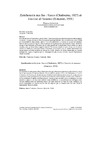Please use this identifier to cite or link to this item:
https://accedacris.ulpgc.es/jspui/handle/10553/55482
| Title: | Zarathoustra aux îles : Vasco (Chadourne, 1927) et Touriste de bananes (Simenon, 1938) | Authors: | Gérard Lojacono, Florence | UNESCO Clasification: | 570107 Lengua y literatura | Keywords: | Chadourne Simenon Nietzsche Tahiti |
Issue Date: | 2016 | Journal: | Theleme-Revista Complutense De Estudios Franceses | Abstract: | En el periodo de entreguerras, Marc Chadourne y Georges Simenon compartieron varias aficiones: viajar, leer y, por supuesto, el reportaje literario. En este artículo, gracias a Vasco de Chadourne y a Touriste de Bananes de Simenon, nos desplazaremos a Tahití, donde residieron ambos autores. En las dos novelas, seguiremos a unos protagonistas que abandonan la Francia continental para asentarse en la Polinesia, a la que consideran el entorno ideal para renacer. Veremos cómo en ambos textos se anhela la isla como remedio al spleen y, a la vez, como antídoto contra el nihilismo. A pesar del exotismo del lugar y de la luz que centellea sobre una naturaleza intacta, no logran alejar de sus vidas las viejas cobardías. Las playas inmaculadas no pueden con las olas de angustia que los hunden cada vez más. Hasta el agotamiento. Hasta el suicido. En cette période de l’entre-deux-guerres, Marc Chadourne et Georges Simenon ont de nombreux intérêts communs : voyages, lectures et, bien sûr, le grand reportage littéraire. Dans cet article nous irons à Tahiti, où ont séjourné les deux auteurs, grâce à Vasco de Chadourne et à Touriste de bananes de Simenon. Dans les deux romans il s’agit de suivre le parcours d’un protagoniste qui, fuyant la France, aborde les rivages d’une Polynésie qu’il pense être le cadre propice de sa renaissance. Nous verrons de quelle manière, dans ces deux textes, surgit le désir de l’île comme remède au spleen d’une part et comme antidote au nihilisme d’autre part. Même si l’exotisme est au rendez-vous, la lumière étincelante d’une nature intacte se révèle incapable de chasser les vieilles lâchetés, les plages immaculées ne peuvent endiguer les vagues d’angoisse qui les submergent de plus en plus souvent. Jusqu’à l’épuisement. Jusqu’au suicide. In the interwar period, Marc Chadourne and Georges Simenon had many common interests: travel, readings and, of course, literary reportage. In this paper we will travel to Tahiti—where both authors lived—through the works Vasco by Chadourne, and Touriste de bananes by Simenon. Each novel follows the path of a man who, escaping from France, reaches the shores of Polynesia, a land he thinks will be the fertile ground for his rebirth. We will see how, in both novels, the desire for the island arises— on the one hand as a drug against spleen, and on the other as an antidote to nihilism. In spite of the island’s exoticism, the sparkling light over its unspoilt nature cannot possibly dispel the cowardice latent in their lives. The immaculate beaches are powerless to quell their pangs of anxiety, and the protagonists are increasingly overwhelmed by angst ; until exhaustion sets in. And then, suicide. |
URI: | https://accedacris.ulpgc.es/handle/10553/55482 | ISSN: | 1989-8193 | DOI: | 10.5209/rev_THEL.2016.v31.n2.52786 | Source: | Thélème [ISSN 1989-8193], v. 31 (2), p. 283-296 |
| Appears in Collections: | Artículos |
WEB OF SCIENCETM
Citations
1
checked on Feb 8, 2026
Page view(s)
84
checked on Jan 10, 2026
Download(s)
61
checked on Jan 10, 2026
Google ScholarTM
Check
Altmetric
Share
Export metadata
Items in accedaCRIS are protected by copyright, with all rights reserved, unless otherwise indicated.
